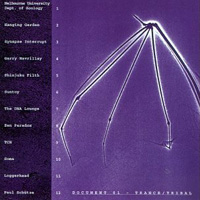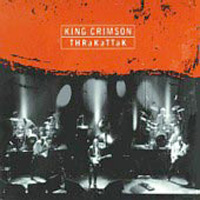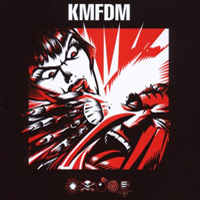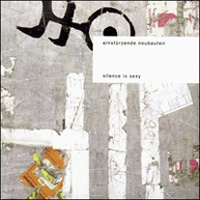 Einsturzende Neubauten
Einsturzende Neubauten
Silence is Sexy (Mute)
An interview with noise scientist N.U. Unruh
by Lex Marburger
I guess it all started about 10 years ago in my brother’s apartment. He pulled out a record and said, “You gotta listen to this. It’s like sleeping on a bed of nails.” It was Einstürzende Neubauten (or, as they’ve been known in the Lollipop office, “Isaidsomething Noisyboutem”), and the shrieks, bonks, clangs and scrapes that came through the speakers were completely incomprehensible. But something stuck with me even though, or maybe because, it was so damn confusing. I couldn’t figure out what the hell was being said cuz it was all in German. Sounded great tho’. I immediately added Neubauten to the “let’s figure this damn stuff out” file and tracked a good deal of their work down.
For those who have no idea who I’m talking about, Neubauten started out in 1980, with the purpose of destroying music and shattering the conventions of sound so something new could grow and/or be built. And they did, at least for themselves. Unlike the UK punks of the time who just wanted to destroy music (or at least that’s what Malcolm said), Neubauten was all about taking the sounds to their furthest extreme. They used oil drums, sheets of metal, sledgehammers, shopping carts, and even set stages on fire to achieve both their music and their purpose.
So the new album comes in, along with an email: Did I want to interview lead singer Blixa Bargeld, in person, when Neubauten came through town? Did I? Fuck, yes! So I slapped the disc on (actually, it’s two discs; the second one with only one 18-minute long song) called Silence is Sexy (Mute). OK, first thing: The title is in English. No Halber Mensch, no Zeichnungen des Patienten O.T., no Ende Neu. Rather Silence is Sexy. Hmmmm. Silence is Sexy. True, Ende Neu got pretty mellow at times, much less skronk and clatter than usual, but… Silence? Is that the last step for Neubauten?
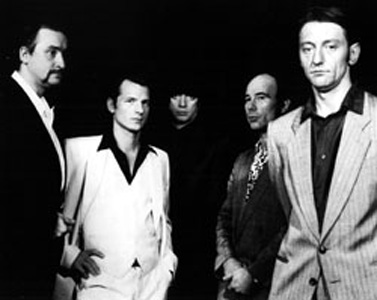 “Why not? Loud means more expression, because it’s more heard, but if there’s only silence, that can also be aggressive. ‘I paid to hear something! What are you giving me?'”
“Why not? Loud means more expression, because it’s more heard, but if there’s only silence, that can also be aggressive. ‘I paid to hear something! What are you giving me?'”
OK, I’m down with it. The title track is pretty damn minimal, with stretches of Cage-like silence, punctuated by Blixa smoking a cigarette. In fact, there’s very little direct aural prodding (of the annoying kind) except for “Circles,” which swings about wildly and wonderfully. Then, too, the bass seems to take over musical duties for most of the album – a quiet, pensive bass. A bass that is more melodic and richer than ever. Dare I say, sexy?
“Musical, yes, musical. A hook line is good to have. It’s better than just a rhythm – a bass line is melody and rhythm together. Alex [Hacke] played bass for the first time in a priority role. That is very necessary for the band we have now, as we have a new drummer and guitarist. The sound has become more melodic. Why not? Blixa said he didn’t want to scream on this record. Not only the high-pitched ones used for effect, but he didn’t want to scream or yell, to work against the metal drum sounds, or the guitar and bass. The recordings for Silence is Sexy started with having Blixa with a Hammond organ, a Fender Rhodes electric piano, and a vibraphone.”
Me: (Incredulous gaping.)
“Yeah, it started with that. Why not? We started the whole rehearsal with these three “new” instruments. They’re very traditional, but we’re using them in a new way. Just by pressing a bass pedal as a nice background, just playing melodically. And that’s a big help for a singer to play with these tones, everything is easier this way. So do we go back to traditional song patterns after we’ve discovered what else there is? I don’t think it’s a wrong step. It’s very “Wow” because it actually proved that all this different instrumentation will indeed work in a traditional way. We’re not like scientists; we’re playful guys. Most of the time our songs are about surprising lyrics, surprising instruments, surprising standards of fitness from the people playing.”
So I was getting an interview and seeing the show, what could be better? But something was funny here… Why would WAAF and WBCN be here? And exactly how many tour buses do these guys need, anyway? The street was lined with buses and vans, and all sorts of fanboy promo machinery. The meaty bouncer gives me the scoop: Stone Temple Pilots was playing in the venue right next door. In fact, they hogged EN’s dressing room, so Neubauten got fed up & found another one. But to reach it, you had to walk through a garbage-infested alley. Not the most dignified approach, but certainly appropriate. This should make for an interesting mix. White-hatted jock fucks mingling with hardcore industrial/noise freaks. The scenario almost writes itself: “What the fuck YOU lookin at?” “Fuckin freaks.” BANG! POW! Heh heh.
As I was ushered in, I was told there was a problem. Seems Blixa’s plane from Chicago was late. Quite late. Heart sinking, my mind frantically racing, trying to figure out how long it would take to get to the airport and accost Blixa as he stepped off the plane, my mouth foaming, tape recorder in hand, babbling incoherent questions, and to my surprise, a soft German voice spoke up behind me. “I vill take overr fer Blixa.” Turning, I found myself looking at the elderly elfin face of N.U. Unruh, the crafty noise scientist who’s built the majority of instruments for the band. Fuck, I’ll gladly talk with him! Maybe even more than Blixa. I mean, Blixa’s been the mouthpiece for Neubauten for 20 years now, he’s gotta be a little cynical about these interviews by now, huh? But N.U… Damn straight. He’s the guy who always looks like he’s having the most fun onstage, banging on coiled springs, burning plastic, smashing steel rods together, all that.
We wandered around the club for a while looking for the perfect spot, and finally settled into a shadowy nook, where, as N.U. ate yogurt and smoked cigarettes, I stumbled through my questions as best I could.
 What were you expecting when you started out, twenty years ago?
What were you expecting when you started out, twenty years ago?
I didn’t expect anything. Blixa came to my place in Holland where I was learning piano restoring, and said, ‘Come on, let’s do a band.’ Why not? I had a wish to do a concert with him, and it carried on after all this time. We must have done something… right.
You make many of Neubauten’s instruments.
Yeah, that’s right, all the percussive stuff. I built myself a metal drum kit after I was unable to pay my rent. I sold my old drum kit and changed to tin sheets, an all-metal bass drum and hanging toms. I discovered that metal sheet is exactly the same as a snare drum. And then I looked for something to substitute the bass drum [sound]. I had a thick expansion spring, and I put a contact mic to it. It made a tremendous bass drum.
That’s the contraption between the two poles…
Yeah, I’ve had it for 20 years, this instrument! It really does work out. In the song “Yü Gung,” it’s mainly just that. It’s a complete substitute for bass frequencies in a percussive way. I’ve built some other string instruments, like The Lulu and The Curve, which is also good for bass frequencies, and that’s what counts on stage – to amplify bass frequencies and not just treble. Treble doesn’t bring anything. Anyone can slam on car doors, but it’s not a really good sound. I’ve found you need a certain “ring” in the metal so it gives you some impact, more overtones. And then I find it nice to listen to.
- He makes it sound so easy. Just abandon all preconceived knowledge of music and start over, fresh, from nothing, reject all structure and stick to your ideals for two decades (dozens of albums, films, theater projects, more more more), unflinching in stance and creative prowess. No problem, I’ll start tomorrow.
Do you first make an instrument and then see what sounds it makes, or do you have a sound in mind before you begin?
Well, the shopping cart I had, for instance, we were just using it for transport reasons, and after a while I just put a contact mic onto the wiring of the basket, and dragged a stick along the side. Why not? It sounded great! Sometimes we just get something and make an instrument out of it. Most of the time, though, we already have one part [of a song], and I’m thinking of a different part to add to it. I’m thinking that I’ve already been through most materials… Plastic, wood, polystyrene, metal — all kinds of metal… Aluminum, brass, hardened steel… I’ll tap anything.
Like a water tower in “DNS-Wasserturm”…
Yeah, that’s a special architecture thing. The sound in a room, a round shape, develops differently because you hear yourself with an echo. That isn’t an instrument you can travel with. I have to build these things with the intention of bringing them to a different country where they will still work. I mean, you can bring anything into the studio, but to bring it live, where people can see it, that’s the difference between us and the sampling method. You can sample anything… The galaxy, an airplane, but it doesn’t really bring it to you, to your ears.
- ‘You can bring anything into the studio.’ Once again, this guy’s humble responses belie what incredible freaks Neubauten are. On one of their earlier tracks, they brought a dog into the studio and put a contact mic on his throat and recorded it eating cow entrails. Maybe it was pig entrails. I can’t remember. This, while wiring Blixa for sound and having drummer F.M. Einheit pummel the man’s chest, his fists cracking ribs all the while. You get the feeling that Neubauten gives priority to the sound, regardless of cost. And N.U. is the grandest visionary, wanting to sample the entire galaxy before he considers sampling an airplane!
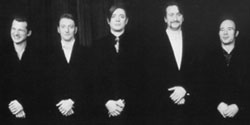 The possibility for sampling something enormous, like the water tower, and then playing it onstage… a lot of bands do that, but it seems you’re going for a visual, and maybe more. When I play found objects, they change, bend, the sound changes, it evolves almost. That seems to be an intent of yours.
The possibility for sampling something enormous, like the water tower, and then playing it onstage… a lot of bands do that, but it seems you’re going for a visual, and maybe more. When I play found objects, they change, bend, the sound changes, it evolves almost. That seems to be an intent of yours.
Mmm… Yes and no, because you want to reproduce songs. If you have them only working one time, it’s no good because something like that is only authentic once. I mean, sure, its magical, OK, why not?, but if you’re going to work it out on a bigger level, you have to have reliable instruments you can tune, or stay consistent. I mean, a shopping cart – it has one sound, yeah? But we don’t use that anymore because it was a kind of political statement about the homeless, you know? When we use an instrument for five years, that’s about enough. Everyone got a kick out of that – ‘Ooh, a shopping cart’ – but the instruments now are much more reliable. Now, the metal pieces are more dependable, and they’re easier to transport. Like the aluminum rods in ‘Haus der Lüge’ do almost the same job every time. But I know what you mean. You can get a certain performance out of objects, a performance of their own as you play them.
- Obviously, Neubauten knows how to get a performance out of an object. The show that night was full of objects to be plucked and struck, including the inside of a jet engine (this, I believe, is the “utopian sidegrinder” slyly referred to in “NNNAAAMMM”). The songs went flawlessly, which is an odd thing to say. Neubauten has such control over their chaos that you actually start yearning for all hell to break loose, for some searing shriek to erupt from the speakers. Even their older material is restrained. In a way, Neubauten is so ahead of their time (or so off to the left of their time. The same thing, really) that they have no one to challenge them. I mean, the guys next door, STP, have serious competition. They’re always in danger of losing their core audience to some upstarts with a junkie singer and a competent backing band. But Neubauten almost sound as if they’re resting on their laurels. Perhaps the permanence of their instruments has led to a complacency?
It seems that in the first five years of Neubauten (’80-’85), impermanence was indeed your goal. On Strategies Against Architecture I, for example, there are two radically different versions of “Schwartz.” So when did the attitude change to “let’s be able to reproduce what we do”?
That was a searching phase, discovering, researching. How does this sound in that room, how is it connected with that other sound? After we found that we could stick with certain things, like the bass spring, or just ordinary metal sheets… We were fiddling with a lot of bass drum sounds at that time, Mufti [F.M. Einheit] had a special-built bass drum that only worked for about 10 seconds (laughs). Mufti was a big physical statement, to prove that it could be done, whether they were reliable or not. We went through that, it gave us the unique experience that we carried with us from that point on.
- So we can chalk up the control of sound and chaos to simple evolution of the band, but not the fact that the music doesn’t explode like it used to. Maybe the new players have something to do with it. They lost long-time bassist Mark Chung as well as F.M. Einheit, a drummer of considerable strength and endurance. And, to tell it true, during the show, it seemed the drummers (other than N.U., of course) were more concerned with playing the beat than creating a sound.
Mufti left just around the time Ende Neu came out.
Yeah, there were different reasons for that. Personally, I’m still friends with him, but it’s somehow unclear why he left. I heard a report that he couldn’t work with Blixa’s lyrics anymore. There were a lot of problems. It’s kind of a marriage, all these years we know each other too well.
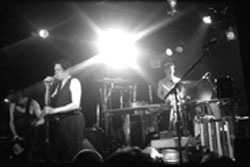 When he released his last album, he refused to talk about Neubauten – he wanted to promote his own album.
When he released his last album, he refused to talk about Neubauten – he wanted to promote his own album.
It’s an open wound, still.
Even during Tabula Rasa, the music began to become softer, adding violins, becoming more melodic, and orchestral.
And why not? I wouldn’t say that F.M. Einheit was against that. I mean, he loves all those smeary tones. No, I think there was something deeper going on. Not just musical opinions. I really can’t say exactly. I spoke with him, and he generally thinks of Blixa as a dictator. Blixa is our spokesman, and he should be. It’s just a conflict of group dynamics after all these years. Mark Chung also left the band for personal reasons, and company reasons. I mean, I won’t burn my mouth… (laughs).
- Sure, he won’t burn his mouth, but he’ll burn the stage. Neubauten has been known to set fire to the stages they play, not to mention smashing them with jackhammers and axes.
I wouldn’t say we haven’t been aggressive of late, I have the same feeling since I was 19, but at different levels. It doesn’t mean you have to make music like Rage Against The Machine, you know, all that. You see, when we first set fire to stages, it was because we were angry, because people felt only ‘these silly German blokes just banging on metal’ and all that. They were giving us… shit, they treated us awfully in the music machinery. So it was something to do to get some attention, a very symbolic act. It’s not the same as the metal instruments, no one thought we could go on so long bashing metal pieces. Like using an axe – a real axe not a guitar – for musical expression, or F.M. Einheit using a shovel, digging holes, and using it musically. Why not? Because our aim was to use everything. Fire makes a sound, everything in our environment does.
If I remember correctly, you’ve used melting plastic, too.
That was my fault, that was mine (smiles). During the Desert Storm thing, we were in the studio, watching CNN and all that. Blixa thinks of the desert as a very beautiful place because it’s empty, clean and all that. So they were doing this war down there, and we were in the studio, and we asked, “What is that territory? What are they fighting for?” I mean, just very simple questions. So we brought up some sand and tried to record that, which was very easy. But how do you record oil? I thought, OK, a plastic bag is 50% oil and some other salts, and I remembered my old school days when we burned things, when everybody burned things. Why not? When you burn plastic, it gives off a certain sound, and because it’s still burning in the air, I had three mics in a row, in mid-air, catching the sound as it fell. And visually, it’s powerful too. What would that be if we sampled it? It wouldn’t work!
-
- Neubauten’s music is inseparable from its image. Even when you hear a recording of Blixa smoking a cigarette in the gaps of “Silence is Sexy,” the crackling, sucking sound cannot be separated from the image of a half-lidded Blixa, standing with one hand up to his lips and one arm wrapped around himself, keeping the noise inside. Which is a completely different image than what I got after the interview, when Blixa finally stumbled in. Impeccably dressed in a three-piece suit, he was obviously exhausted. Dragging his valise across the room, he looked in vain for the dressing room (not knowing it was across the way, through that filthy alley). “Peter,” he called to the tour manager in a voice thick with fatigue, “dressing room.”
“What was that, Blixa?” Peter asked, eager to try and fix all of this man’s problems.
With the look of a man pressed to the limit, he peered over his sunglasses and bellowed, “DRESSING ROOM!” and everyone went scurrying.
Man, good thing I wasn’t doing the interview with him… I’m sure he’s a nice enough fellow, but I’m comfortable waiting to find that out. But maybe the answer to the question of control (posed to N.U. Unruh) comes from Blixa himself, with his involvement with his side projects.
Blixa has been working with Nick Cave and the Bad Seeds…
Yes, that’s influenced him, definitely, of course, all of us…
Especially with an album like The Boatman’s Call, where you heard almost nothing from Blixa, but when he did play, it was a very important and necessary thing. Did that affect his ideas, and everyone’s ideas, about Neubauten music?
Yes and no… I mean, the evolution of Neubauten’s history is… We went through our research period, picking up different kinds of music. Since our aim is to broaden musical limits, we started bringing music to anywhere. So the orchestration thing, why not? I would even like to do horn sections and have the harmonies much more complicated. Why not? Different stuff like a horn section or guest musicians. Not just for the mellow, more listenable aspects… It’s already listenable.”
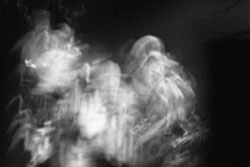 Oh, yeah, we have blues sessions… Blixa was a big fan of blues music when he was a teen, but…. Why not? It’s all expressive. We’re expressive people, and this is expressive music… We’re white persons anyway, so we can’t really do it well. The same with funk. It’s tough to listen to whiteys do it, yeah? America is a different scene, yeah? And there’s different musics, and we’re free to use them all whether they’re white or black. I mean, there’re also blacks copping white music, and why not? Let’s see what people can make out of it! We’re not specialized in that, but Nick went deeper into that, for sure, because he’s an English singing person. For Europeans, like us, it’s quite a different thing to get all the social and historic details, and, you know, the poetry around it. We’re not so much connected with that culture. For instance, “I wish that would be your color.” [a lyric taken off the opening track on Silence is Sexy] An English person wouldn’t say it like that. It becomes different. I’m not sure if Blixa is aware when he does it. There was even Spanish and French on Ende Neu. He just likes fiddling around with languages. He feels that language is like a music which is like a language. And expressing yourself in a different language… I mean, we’re not touring Spanish-speaking countries regularly, we only went to Spain once, but I think it’s good that he shows intelligence. Again, why not? It’s like tones, the different languages, the flow… I think it bugs Blixa that he doesn’t speak all languages in the world. In ten years, he’ll be speaking Chinese (laughs)… He already does very well in Japanese, Italian…. But me, I was born and lived in America until I was five. My whole English is schoolboy English, and you can tell it. Now I have a German accent when I speak English; can’t help it. You cannot re-learn it. Blixa has all these different thinking levels, the sounds of the languages. Maybe he had a French friend he wanted to give a certain line to… I don’t know. Singers, yeah? (laughter)
Oh, yeah, we have blues sessions… Blixa was a big fan of blues music when he was a teen, but…. Why not? It’s all expressive. We’re expressive people, and this is expressive music… We’re white persons anyway, so we can’t really do it well. The same with funk. It’s tough to listen to whiteys do it, yeah? America is a different scene, yeah? And there’s different musics, and we’re free to use them all whether they’re white or black. I mean, there’re also blacks copping white music, and why not? Let’s see what people can make out of it! We’re not specialized in that, but Nick went deeper into that, for sure, because he’s an English singing person. For Europeans, like us, it’s quite a different thing to get all the social and historic details, and, you know, the poetry around it. We’re not so much connected with that culture. For instance, “I wish that would be your color.” [a lyric taken off the opening track on Silence is Sexy] An English person wouldn’t say it like that. It becomes different. I’m not sure if Blixa is aware when he does it. There was even Spanish and French on Ende Neu. He just likes fiddling around with languages. He feels that language is like a music which is like a language. And expressing yourself in a different language… I mean, we’re not touring Spanish-speaking countries regularly, we only went to Spain once, but I think it’s good that he shows intelligence. Again, why not? It’s like tones, the different languages, the flow… I think it bugs Blixa that he doesn’t speak all languages in the world. In ten years, he’ll be speaking Chinese (laughs)… He already does very well in Japanese, Italian…. But me, I was born and lived in America until I was five. My whole English is schoolboy English, and you can tell it. Now I have a German accent when I speak English; can’t help it. You cannot re-learn it. Blixa has all these different thinking levels, the sounds of the languages. Maybe he had a French friend he wanted to give a certain line to… I don’t know. Singers, yeah? (laughter)
- Singers, yeah. Bass players, too. While I waited for the show to start in a bar across the street, Alex Hacke walked in. Seems the day before, he was in Indiana with David Yow of Jesus Lizard fame, smoking pot on Yow’s farm, drinking lemonade. Must be nice, huh? Legendary bassist hanging out with legendary vocalist in the heart of the Midwest, getting high. What was especially amusing was seeing Alex and the other members (sans Blixa and N.U.) gathered around a patio table, peacefully drinking and having dinner, while not two feet away, kids with Neubauten T-shirts, green hair, leather jackets, and spiked collars shuffled past, oblivious to the fact that the band they would soon be telling their friends was so cool – cuz he looked right at me! – was right next to them, merrily chatting away. So utterly American.
Have you noticed any difference between American and European fans, in what they are looking for at a live show?
It’s astonishing to me that when we played “Zebulon,” a very old song, people clapped along to it. They clapped! It’s a very quiet song, little drums, they clapped to hold the rhythm! There’s no rhythm of its own! Some people are more attracted to the rock side. In Europe, they listen more… At different points, you can be hooked to Neubauten, live or music-wise. Some people are more interested in Blixa, some in the instruments, but I couldn’t say there’s a real difference. I don’t talk to everyone, but we also do festivals, and site-specific performances, so it differs from place to place. I’m glad we have the kind of audience that has different things to focus on. Because it’s not so clear as the idea that you get in, say, heavy metal. Straight away, you’re guaranteed 20 guitar solos per set, and then the audience is satisfied.
- The show ended up with “Ende Neu,” and then the chaos really came out. They stepped up and brought the noise with them, artificial polyrhythms, guitar screeches and explosions of groans and grinds, the approach of the absolute random with these lone men holding it back, barely, riding the crest of an aural tsunami, German cowboys bullriding sonic anarchy. Blixa with an air compressor jammed in his mouth, Alex dripping sweat onto his bass, N.U. looking like an alchemist bent over his devices, grinning mischievously, lost in the sound.
We put them into a cold bath and then a warm bath, and then put them in the cold water again, and I don’t know if they can make something out of it, but they keep on coming back.
(www.neubauten.org)

